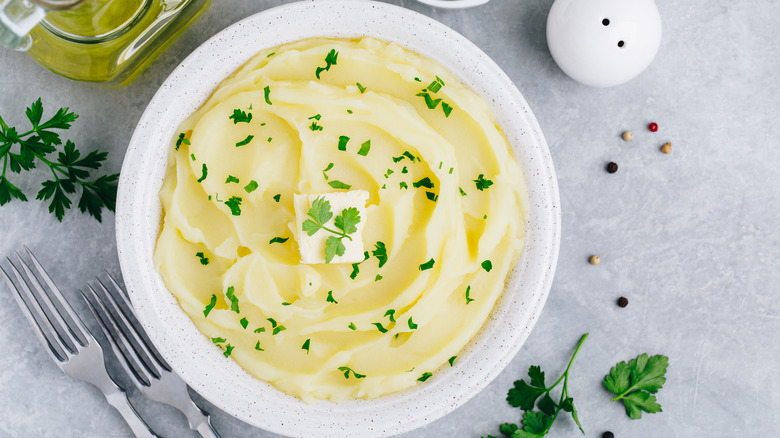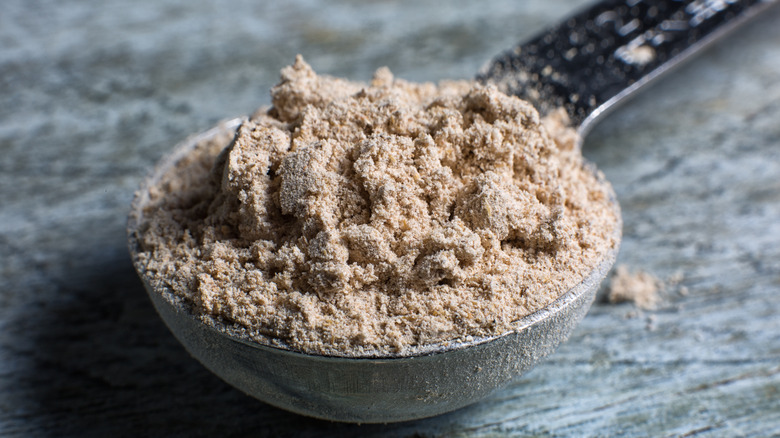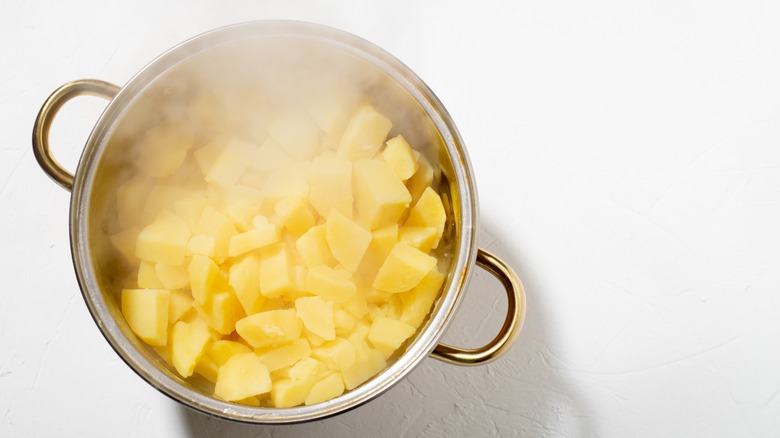The Scientifically-Proven Ingredient For The Smoothest Mashed Potatoes
There are few pantry standbys that are more delicious — or more versatile — than potatoes. Whether you serve the starchy root vegetables as french fries, potato salad, roasted potatoes, or breakfast potatoes, they can be relied upon to bring yummy flavor and a range of textures to any home-cooked meal.
Of the myriad potato recipes out there, it's difficult to think of one more iconic than mashed potatoes. Typically a simple yet satisfying combination of boiled potatoes, butter, and milk or cream, mashed potatoes are welcome nestled against a holiday roasted turkey or spooned next to an everyday comfort food, like juicy meatloaf or thick-cut pork chops. Mashed potatoes are quick and easy to make, and can easily be tailored to individual palates with mix-ins such as shredded cheese, crumbled bacon, or sliced green onions.
And if you're preparing to mash up a pot of potatoes anytime soon, read on because there's one ingredient you can add for velvety, extra-smooth mashers — that you might not have even heard of.
This ingredient beloved by bread bakers makes extra-smooth mashed potatoes
Have you ever heard of diastatic malt powder? If you're an avid at-home bread baker, you may have: According to King Arthur Baking, this enzymatic powder derived from malted grain promotes a robust rise, lovely texture, and a nicely browned crust in bread, yeasted doughnuts, and even homemade pretzels. And according to the food experimenters over at Nathan Myhrvold's Modernist Cuisine, the powder is the secret to velvety mashed potatoes — that don't even require the typically dairy-rich ingredients of butter, milk, or cream.
The outlet writes that this enzyme helps break down the starch in potatoes into sugars, leaving a very smooth result — no sore arm from mashed or milling potatoes needed. All you have to do is fill a pot with water, adding 2 grams of sugar and 3 grams of salt for every 100 milliliters of liquid. You'll then add in peeled, cubed potatoes that you've weighed using a kitchen scale, keeping in mind that 100 grams of potatoes equal about ⅔ cup or one serving (via Healthline).
Cooking the potatoes
Once the potato cubes are in the salted and sweetened water, simmer them until tender — just as you would with regular mashers — then drain them, place them in a bowl, and mix in 1 gram of malt powder per 100 grams of potatoes (via Modernist Cuisine). Pass the taters through a ricer into a plastic zip lock bag (you can set it over a bowl to make the process easier).
Now here comes the science-y part: Set the bag of riced potatoes in a pot of hot tap water (about 125 degrees Fahrenheit) for 30 minutes. Modernist Cuisines explains that the heat activates the enzymes in the malt powder, which start eating up the potato starch. After a half hour, take the potatoes out of the bag and heat the puree to at least 167 degrees to halt the enzymatic process.
Once you've completed these somewhat technical — but straightforward — steps, you'll be left with ultra-smooth, ultra-velvety potatoes that can be seasoned to taste. No dairy or fat of any kind is needed, so these mashers are the perfect option for vegan diners or those avoiding added fats and oils. The process might feel like magic, but it's actually science!


